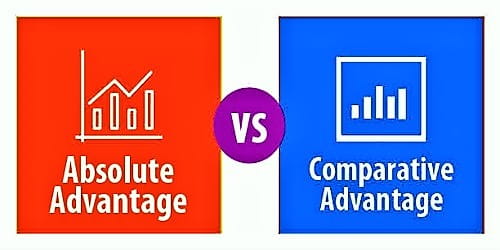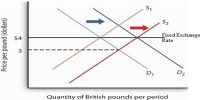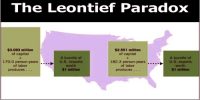Comparative advantage: it is a concept where Ricardo said comparative advantage stage is that a country should sell those products to other countries that it can produce most efficiently and effectively and buy those products from other countries that it cannot produce as effectively or efficiently.
It refers to a country’s ability to produce a particular good with a lower opportunity cost than another country. If a Country can produce an exacting good at a lower opportunity cost than any other country then it is said to have a comparative advantage.
Absolute advantage: According to Adam Smith if one country has absolute advantage another country in one lone of production and other country has an absolute advantage over the first country in another lone of production then both countries would gain by trading. It refers to a country’s ability to produce a certain good more efficiently than another country.
Absolute advantage is when a Country can produce exacting goods at a lower cost than another country. An example of absolute advantage: Colombia has climatic advantages for producing coffee. Thus, it can produce coffee at a lower cost than other countries
Differences
Absolute advantage and comparative advantage are two vital concepts in economics and international trade. They mainly control how and why nations and businesses allocate resources to the manufacture of exacting goods.
- Absolute advantage – Absolute advantage looks at the competence of producing a single product. This analysis helps countries avoid the production of products that would yield little or no demand, leading to losses. It refers to the uncontested superiority of a country or business to produce a particular good better.
- Definition: The ability of a country to produce more goods with the same amount of resources than another country.
- Basic Concept: It deals with a lower marginal cost of production of a specific good in comparison to competitor Country.
- Benefits: Trade is not mutually beneficial. Trades transactions between countries having the absolute advantage are not mutually beneficial in nature.
- Cost: The absolute cost of producing goods impacts if the country has an absolute advantage. Here, the capability to produce more of a given product using less of a given resource than a competing entity.
- Cost of Production: Absolute advantage refers to lowering the production cost of a specific good in comparison to competitors.
- Economic nature: It is not mutual and reciprocal
- Trade Benefits: Concept of absolute advantage may not always be mutually beneficial for both the countries involved in a trade transaction.
Comparative Advantage – Comparative advantage takes a more holistic view, with the perspective that a country or business has the resources to produce a variety of goods. It introduces opportunity cost as a factor for analysis in choosing between different options for production diversification.
- Definition: The ability of the country to produce good better than another country with the same amount of resources.
- Basic Concept: It deals with lower marginal and opportunity cost of production of a specific good in comparison to competitor Country.
- Benefits: Trade is mutually beneficial to both countries. Trades decisions based on comparative advantage are mutually beneficial in nature.
- Cost: The opportunity cost of producing goods impact the Country’s comparative advantage. Here, the ability of a party to produce a particular good or service at a lower marginal and opportunity cost over another.
- Trade Benefits: Concept of absolute advantage may not always be mutually beneficial for both the countries involved in a trade transaction.
- Economic nature: It is mutual and reciprocal.
- Cost of Production: Comparative advantage specifically refers to the lower opportunity cost of production of specific goods in comparison to competitors.
- Trade Benefits: Both the Countries in transactions are mutually benefitted because of the comparative advantage of each other.














